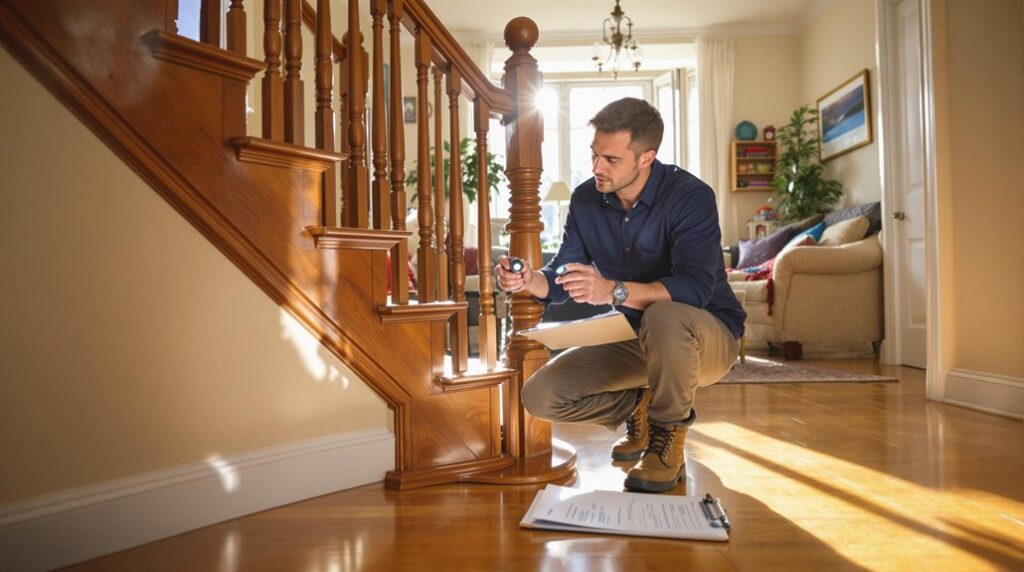Local home inspector services play an essential role in evaluating residential properties. They reveal hidden issues like structural damage, plumbing leaks, and electrical problems that could impact your investment. During an inspection, the inspector assesses the property's exterior and interior systems, providing a detailed report of findings. This report helps you negotiate repairs or price adjustments and plan for future maintenance. Uncovering more about the inspection process can help you understand its importance even further.
The Importance of Home Inspections
When you consider buying a home, understanding the importance of home inspections is essential, as they can reveal hidden issues that may not be immediately apparent. A thorough inspection allows you to identify potential problems, such as structural damage, plumbing leaks, or electrical hazards, which could lead to costly repairs later. By uncovering these issues early, you can negotiate repairs or adjustments in the sale price, ensuring you make a well-informed investment. Additionally, home inspections provide peace of mind, knowing that you're aware of the property's condition before committing. They also help you prioritize future maintenance tasks, allowing you to budget accordingly. Ultimately, investing in a home inspection is a vital step in the home-buying process, protecting your financial interests.
What to Expect During a Home Inspection
Curious about what happens during a home inspection? First, the inspector will arrive to assess the property's exterior and interior systems. This includes checking the roof, plumbing, electrical systems, and appliances. You'll likely follow along, observing the process.
Here's a quick overview of what to expect:
| Inspection Area | What's Checked |
|---|---|
| Exterior | Roof condition, siding, and drainage |
| Interior | Walls, ceilings, floors, and windows |
| Systems | HVAC, electrical, plumbing, and appliances |
After the inspection, you'll receive a detailed report outlining findings and recommendations. This report serves as an essential tool for understanding the property's condition and aids in decision-making regarding repairs or negotiations.
Common Issues Found in Home Inspections
While every home inspection can reveal unique concerns, there are several common issues that frequently emerge across various properties. Understanding these issues can help you prepare for potential fixes and negotiations during the buying process.
Here are some prevalent findings:
- Roofing problems: Missing shingles or leaks can lead to significant damage.
- Electrical issues: Outdated wiring or insufficient outlets pose safety risks.
- Plumbing leaks: Hidden leaks can damage walls and ceilings, leading to mold.
- HVAC system deficiencies: Poor maintenance can reduce efficiency and lead to costly repairs.
- Foundation cracks: Signs of settling or shifting may indicate serious structural problems.
Identifying these issues early can save you time and money, ensuring a smoother home ownership experience.
Choosing the Right Local Home Inspector
How do you determine which local home inspector is right for your property? Start by evaluating their qualifications and certifications. Look for inspectors accredited by recognized organizations, as this often indicates a commitment to industry standards. Next, consider their experience; an inspector with a solid background in your specific type of property can offer valuable insights. Read online reviews and ask for references to gauge their reputation and reliability. Additionally, inquire about the services they provide and their inspection process, ensuring they cover all critical areas. Finally, don't overlook the importance of communication; a good inspector should be willing to explain their findings clearly and answer any questions you may have. This thorough approach will help you make an informed decision.
Preparing Your Home for an Inspection
Preparing your home for an inspection involves several key steps that can greatly impact the outcome of the evaluation. By taking the time to address specific areas, you can facilitate a smoother inspection process and potentially increase your home's value.
- Clear clutter from common areas, guaranteeing easy access for the inspector.
- Check all light fixtures and outlets, replacing any burnt-out bulbs or damaged covers.
- Ascertain all windows and doors open and close properly, checking for any signs of damage.
- Test your HVAC system, changing filters and confirming it operates efficiently.
- Provide documentation of any repairs or upgrades made, as this can improve the inspector's perception of your home.
